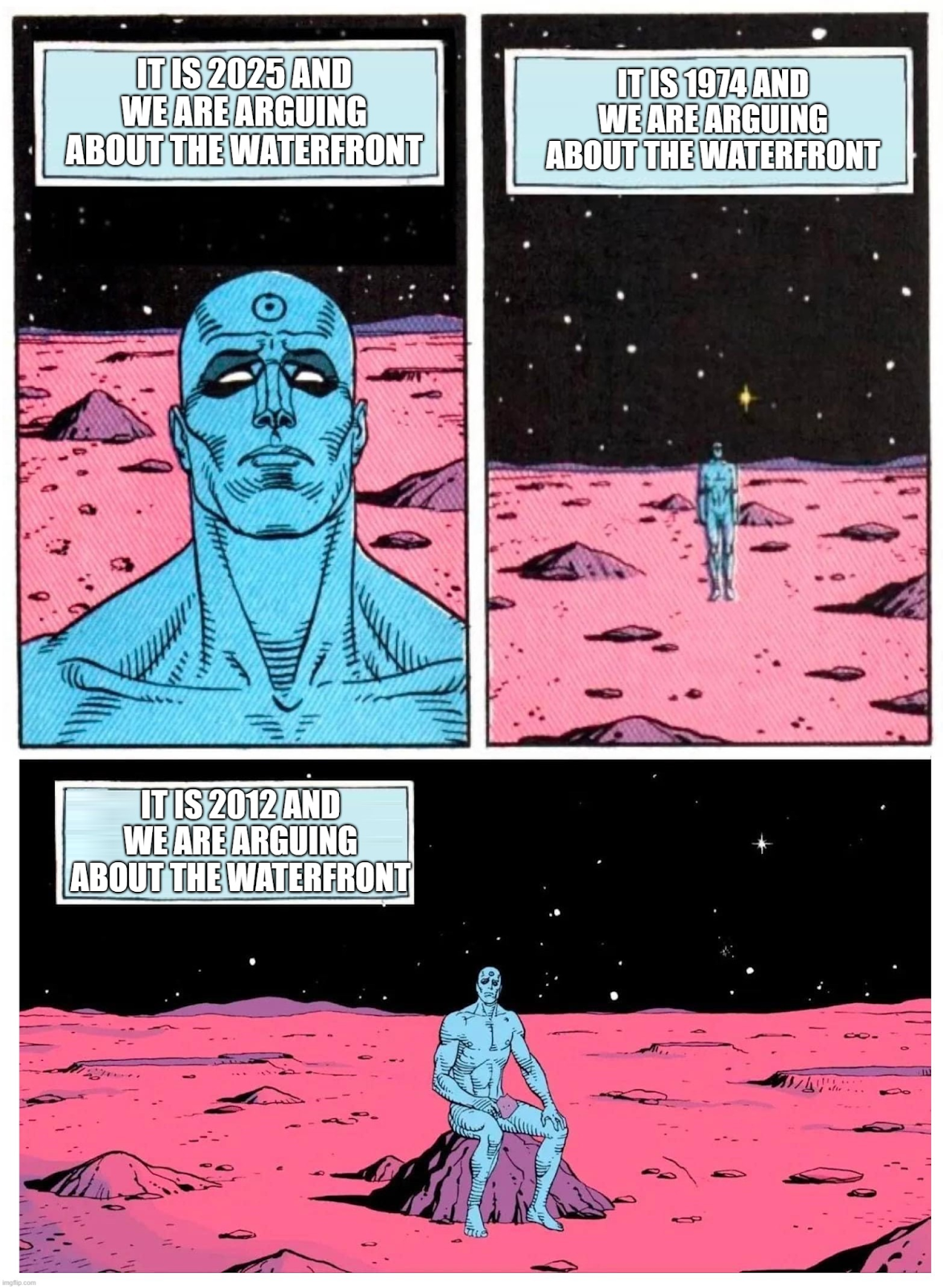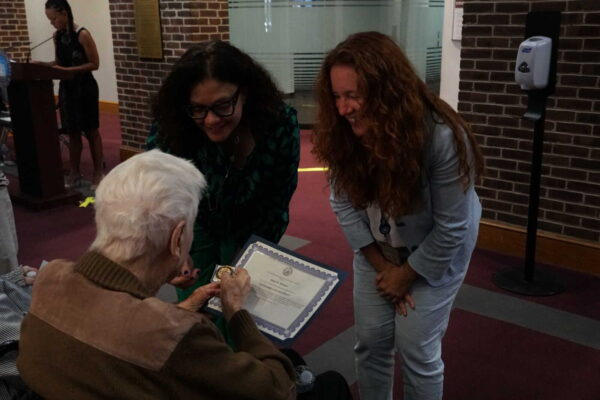Pumped Up
For as long as we’ve lived in Alexandria, people have been arguing about the waterfront. In fact, it’s perfectly reasonable to assume that for as long as anyone has lived in Alexandria, people have been arguing about the waterfront. There is a quaint charm to it, honestly, that no matter where you found yourself on the unspooling skein of time, if you peeked in on the Port City you’d find someone furiously writing a public comment about creating more land with backfill, or proper torpedo storage, or boat house location, or what have you. It would be fair to argue that the one thing that binds us together across generations as Alexandrians, perhaps, is having a hot take about the waterfront.

Our current coveside contretemps concerns the placement of a pumphouse in Waterfront Park, amid fears that it will diminish the view and functionality of the park. And while the official editorial position of this newsletter is that we think the pumphouse is needed, the trepidation that some have about it is understandable and we don’t begrudge them advocating for those views. But this isn’t an essay about whether the pumphouse is good or bad [Editor’s note: to be clear, it’s good] but rather how it is a perfect illustration of so many of the challenges inherent in local decisionmaking.
To begin with, the argument over the pumphouse is an ideal example of how capital projects with long lead times present real challenges to holding together a public consensus. Some people expressing concerns now are only getting caught up long after the initial decisions were made. This timing mismatch goes beyond just attention and engagement, but can also be reflected in the prioritization of issues themselves. In this instance, when the pumphouse was initially proposed and approved, flooding was a *way* more urgent and salient issue than it happens to be at this particular moment in time. That’s not to say that flooding isn’t still important to people! Don’t stick #DrainALX signs in our yard—that’s not what we’re saying at all. Our point here is that this is an example of how public sentiment can shift between approval and implementation from something feeling like a necessary no-brainer (where many might be willing to ignore tradeoffs) to something feeling like an acceptable outcome only if it’s perfect in all ways (and tradeoffs are a cost that needn’t be paid).
And it is tradeoffs that we’re talking about here, which is another reason that this debate is such a useful and interesting example! Fundamentally this debate is one about function (we need this thing) vs. aesthetics (we don’t like how the thing we need looks). This is a perfectly reasonable debate to have! But it’s important to acknowledge it as such. If someone came to us and said “we can power the entire City of Alexandria with 100% clean energy in perpetuity but we’re going to have to build an enormous sphere in the middle of Potomac Yard to do it” we would quite reasonably not be thrilled about the presence and aesthetics of the giant sphere, but the payoff of the function is something that we’d have to give due consideration.

Similarly, the pumphouse is a great example of how hard it is to get people excited and supportive about doing boring things. It is, at the end of the day, not a new school, or an award-winning sewer tunnel, or even a Duke Street gondola. It is… a pumphouse [sad trombone noise]. But cities need to build lots and lots of boring things (honestly, it’s mostly boring things) and while we can add elements on the margins to make them less boring (the pumphouse is going to have public bathrooms!! And an… awning? we guess?) they are still frequently not the kind of project that gets a line of people at the mic waiting to speak in favor of it.
Yet public feedback matters—and is another reason this particular issue is so interesting! This city is no stranger to gathering public feedback, asked for or otherwise [Editor’s note: *stares directly at the camera like Jim from The Office*]. How and where we gather feedback—and how we use that feedback after gathering it—really matters. Friend of the newsletter Alex G. recently posted on social media about the public feedback on the pedestrianization of the 200 block of King. At the hearing there was one speaker, and they were opposed. There were a number of written comments, also mostly opposed. But there was also a survey with 1,842 respondents that was 87% in favor of making the closure permanent, and 75% of businesses on the block backed the proposal as well. All of this feedback is valid, from the opposed speaker to the survey respondents, but we have to constantly remember that some forms of feedback are highly visible (like online petitions and newspaper ads), while others (like participation in advisory groups) are not.
We should probably wrap this up [Editor’s note: yeah enough time has elapsed from the start of this essay to the finish that my opinion about it has shifted] by reflecting on what it is we have learned here [Editor’s note: is it… nothing?]. To us, the clearest takeaway from the pumphouse debate is the need to keep long-term projects visible in the public eye continuously from approval to implementation, and to be constantly updating and sharing the data and evidence that supports why something is necessary and more importantly, what the cost of inaction would be. This is not the last big, important, expensive, boring thing our city is going to need to do—so let’s try and make the consensus that supports the next thing a lasting one.
Things You May Have Missed Because You Have a Life
- Daring to imagine a concept scarier than a bar that plays only Taylor Swift songs, the Del Ray pop-up has reopened for spooky season as “Nightmare on the Avenue.”
- Other exciting events coming up include the Duncan Library book sale, the start of early voting, and the first full weekend of service at the new Pupatella pizzeria. It’s a great lineup of things we definitely need more of: books, democracy, and… yep just books and democracy.
- Fodor’s ran an article last week promoting Alexandria as a tourism destination for people trying to avoid all the armed guards in DC and look, while we always appreciate efforts to attract visitors to our fair city, PLEASE DON’T GIVE THE GUYS IN CHARGE OF FINDING NEW PLACES TO SEND THE TROOPS ANY BRIGHT IDEAS.
- Look on the bright side: there is no downside to this info from the inside that beside Northside is a new ice cream shop Sweetside.
- The CEO of ARHA was officially dismissed following the discovery of his unapproved use of an ARHA unit that we wrote about last issue, and we’re putting this item here in the links so no one has to read the phrase “ARH
Aot Water” ever again. [Editor’s note: Hey! That was one of the good puns!]
Local Discourse Power Rankings
- You Idiots Are Doing This Road Wrong (Previous rank: 4). The city has released design concepts for the East Braddock Road safety and accessibility improvements, and while most of the reactions from the SUV-nut gallery are just boilerplate ChatGPT regurgitations of screeds against road diets past, one comment in particular caught our eye. A local resident, presumably opposed to any changes that would increase travel times for cars by more than ten seconds, snarked: “Perhaps we should return to horse and buggy transportation.” And you know what? Hell yeah, brother. Don’t threaten us with a good time. Let’s get those horseys in here! Clippity clop! While we’re at it, let’s update the ADU policy to include coach houses. Zoning for Stables. More neighbors, more friends, more carriages. We’re gonna be jaunting up and down Braddock Road like 18th century landed gentry with a hot date at Gadsby’s Tavern and a pocketful of shillings. What we’re saying is, let’s Bridgerton this bitch. T&ES, please consider this our official public survey response.
- Vaxxed and Relaxed to the Max (Last week: NR). It’s been a tale of two Alexandrias on the medical science front these days, except that it is under no imaginable definition “the best of times.” In one corner, you’ve got the intrepid folks who have spent the last few weeks on a Kafkaesque quest to find someone who will administer them a covid shot, because apparently getting an annual immunity boost now requires poring over confusing lists of “underlying conditions” like you’re Tom Hanks deciphering a clue in the Da Vinci Code and trading tips on pharmacies willing to give you the jab through covert whisper networks. And in the other corner, a disturbing number of Alexandria parents have decided that measles is overdue for a comeback and stopped vaccinating their kids to the point that we’ve dropped below the threshold needed for herd immunity. What kind of Robert F. Kennedy Jr. “a worm got into my brain and ate a portion of it and then died” nonsense is this? We knew America was getting more polarized but we didn’t realize one of the poles was “pro-rubella.”
- Garden Plot (Last week: 3). Since we last covered this issue things have only gotten messier at Del Ray’s popular outdoor watering hole, as the bar owner’s lawsuit against their landlord was met in turn by an eviction lawsuit filed against them by the landlord. Our take on this issue remains that this is a criminal waste of gorgeous weather. Have you been outside this last week?? Other than the past couple days of rain which *clears throat to activate Dad Voice* we really needed, it has been stunnnnnnnning outside. Our area gets a quota of about ten days like this all year and we just had five of them! And those days were spent with a primo outdoor drinking establishment snarled in litigation! This is what lawyers mean when they talk about damages, isn’t it [Editor’s note: it’s not]. Can we file for damages for nice days lost?? [Editor’s note: we can’t]. Can we take this all the way to the Supreme Court?? [Editor’s note: of course no— shit, actually, who knows these days].
- A Birb by Any Other Name (Last week: 5). For those following along at home with the saga of
PicklesSir Alex“Gregory” the fancy pigeon, we were apprised of quite the plot twist in an article published by WTOP mere moments after we hit send on the last issue of this newsletter. According to the reporter: “When arriving at the station, a station employee said Gregory wouldn’t be found at the station anymore: ‘Oh, he’s at my house.’” We’re sorry… WHAT?? Do you mean to tell us that “Gregory” was ABDUCTED by an Amtrak station agent??? This is unacceptable. Not only did somebody forcibly kidnap this bird—who has been stripped of his identity, his very sense of self, through a coerced name change—but Amtrak did something nefarious and we can’t even blame it on Justin Wilson. All of this leaves us with nothing but questions. Is no bird in this city safe? Why do we, the commuters of Alexandria, not deserve joy? Can we at least get regular updates on ““Gregory’s”” life in captivity so we know our sweet boy is okay? We swear this to our readers: we will not rest until we have answers.

Overheard in ALX
In yesterday’s Alexandria Times editorial regarding the paper’s decision to convert to nonprofit status, the publisher explains:
More and more media companies are converting to a nonprofit business model, around 500 at last count, because they meet two essential criteria for doing so:
1. They provide a vital public service, and
2. They are increasingly not financially viable as for-profit businesses.
What about local newsletters that are unviable from a financial standpoint but not remotely vital to the public? Asking for a friend.
We Get Letters
Longtime reader and number one fan of this newsletter Joe F. writes in this week with a take we’re not sure you all are ready for:
I have recently become aware of a schism developing in Alexandria which makes prior disputes like “Is allowing a duplex on a single-family lot a human rights violation” or “Should we develop the waterfront” look like mere child’s play. On one side of this argument is a position so objectively, morally, and ethically correct that its opponents should be run out of town or, at least, be banned from patronizing any of Alexandria’s 1,200 pizza restaurants. I’m speaking, of course, about the pronunciation of Alexandria’s pay-for-parking app, ParkMobile. Most of you probably instantly read this using one of two variations without stopping to think, and god help you if you instinctively chose the wrong one because you are now dead to me.
The correct, some may say required, pronunciation pronounces the “mobile” like the end of the word “automobile” (pɑɹk ˈmoʊbil). The automobile, for those of you unfamiliar, is a several-thousand-pound metal box that moves 1-6 people at a time while consuming fossil fuels or electricity and the ease of use of which long-time residents of the city believe should be the sole considered factor in any transportation, planning, or construction design. It’s also the thing that ParkMobile allows you to leave in a public right of way. Now, the righteous among you are probably thinking, “Of course, that’s the only possible pronunciation; what sort of cretin could pronounce it otherwise?” The kind that thinks “mobile” is pronounced as in “mobile phone” (pɑɹk ˈməʊbaɪl), because these, at best, misguided creatures argue, that’s the device that runs the ParkMobile app. Poppycock. This is an app for parking cars. It’s the ParkMobile (correct pronunciation) app. It lets you imagine that the contract employees ticketing illegally parked cars are tootling around in a ParkMobile, while they enforce the rules of ParkMobile (correct pronunciation). If you say ParkMobile (deviant pronunciation), you can’t do that.
Maybe an example is in order. Imagine: you’re Bruce Wayne, and you’re driving your Batmobile in Old Town and you want to park on Prince Street. Ha, too bad, there’s not enough parking, if you listen to rich folks like Bruce Wayne. But this is my hypothetical, so there’s a Batmobile-sized spot just a block west of Old Town Books. Now, Bruce parks and pulls up the app on his cellphone, which we’ll call the Batmobile… Wait. Hold up. You know what, never mind.
Many thanks to Joe for giving us something new and unexpected to fight about. What say you, readers? Do you pronounce it ParkMobile (enlightened, correct) or ParkMobile (cursed, horrible mouthfeel)? Tell us in the comments!
One Awesome Thing in ALX
Our city hosts a lot of solemn, dignified ceremonies, so we love it when the community gathers to celebrate something that’s just joyous and fun, like last week’s annual Centenarian Day event. Honoring the Alexandrians who have accomplished the impressive feat of staying alive for one hundred (100) entire years is a really nice thing to do! These elders are truly special. For example, they’re the only people who are allowed to be offended by how we talk about George Washington because they actually knew him.
This year’s celebration took place on September 9 at 5pm, giving our centenarians an exciting opportunity to stay up late. Of the thirteen 100-year-olds living in Alexandria (0.008% of the city’s population), four attended in person. We’re pretty sure they would agree that it was way better than having their names read out on the TODAY Show, as Mayor Gaskins is cooler than Al Roker and also there was cake.

The honorees join the company of other famous centenarians throughout history, such as Qin Dynasty general Zhao Tuo; the philosopher Democritus of Abdera; Adad-guppi, the mother of the last kind of the Neo-Babylonian Empire; and the lady who played the old version of Rose in Titanic. According to ALXnow’s coverage of the event, they attributed their longevity to factors such as maintaining a healthy diet, not drinking, and maintaining low-stress lifestyles, so… haha, yeah, we’re fucked. But all of that just makes us even more impressed by these women and men who are still going strong, and the fact that our leaders make time to honor them each year is a testament to our community’s commitment to caring for each other and lifting each other up in all stages of life.
You can follow Becky @beckyhammer.bsky.social and Jesse @oconnell.bsky.social on Bluesky, or you can e-mail us anytime at alxtranewsletter@gmail.com.
ALXtra is a free-to-read newsletter about current events in Alexandria, Virginia. Subscribe to get it delivered directly to your inbox. Paid subscriptions give you access to the comments. Revenue from subscriptions gets used in the following ways: 1) a third goes into a charity fund, and every time that fund hits $500 we’ll make a donation to a local charity in the name of ALXtra’s readers and we’ll feature and write about that organization, like we did here, here, here, and here; 2) another third of the money will go toward investments in the newsletter; and 3) the final third of the money goes toward self-care for your two intrepid authors.

